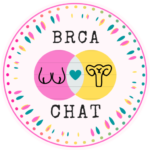What is BRCA?
What is BRCA?
BRCA stands for BReast CAncer. We all have BRCA1 and BRCA2 genes, they are helpful little dudes . They work as tumour suppressors and prevent certain cancers from developing. If you have a BRCA gene mutation they no longer work as effectively, and certain cancers are more likely to develop.
Which cancers, eh?
Most notably, breast and ovarian cancer, but with BRCA2 there are also links to prostate and pancreatic cancer. With BRCA1&2 there is some evidence suggesting links to skin melanomas. Sun cream up beauties.
There is still research been carried out on BRCA. It was only discovered in the 1990s. We still have lots to learn about how it works (or doesn’t work!) and its links to specific cancers.
Gimme some stats…
Most women in the UK have a 12% chance of developing breast cancer. Those with BRCA1 mutations have up to 90% chance and BRCA2 have up to 85% chance.
Most women in the UK have a 2% chance of developing ovarian cancer. Those with BRCA1 mutations have up to 45% chance and BRCA2 10-20% chance.
(See The Royal Marsden)
What about men?
Risks of different cancers
Although it’s clear that the risks of various cancers increase for women with BRCA1 and 2 mutations, the risks to men are often downplayed.
BRCA positive men, particularly BRCA1, has quite drastic impacts on male cancer susceptibility. In one study BRCA positive men developed 8 times as many cancers. BRCA2 men have double the risk of developing prostate cancer, 7 times the risk of developing breast cancer and are over 3 times more likely to develop pancreatic cancer. The survival rate and prognosis of these cancers in men are also much less positive than for the general population.
To mitigate the risk of life-time cancer it is highly recommended that BRCA positive men take extra precautions especially surrounding cancers with higher risk factors. This includes;
-taking regular screens and check-ups with their GPs,
-being vigilant over unusual pains, discomforts or growth on their body and
– limiting other activities that increase cancer risk (including drinking, smoking, being in the sun without sun cream).
Family planning
BRCA and starting a family is a complex and potentially morally-charged issue. Regardless of which partner has the BRCA mutation, a naturally conceived child will have a 50% chance of inheriting it.
For BRCA positive men, this means that starting a family may come with greater considerations and consequences, especially for their daughters. Currently in the UK BRCA positive parents are offered access to various family planning options which they may wish to explore.
These include IVF with Pre-implantation Genetic Diagnosis to prevent the faulty BRCA gene being inherited and prenatal testing where natural pregnancies are tested for the BRCA mutation and the parents make an informed decision regarding continuing with the pregnancy.
.
Read our Trustee Alex’s experience of being a BRCA+ Man here.
Where did it come from?
Whoa, that’s a big question… but simply, it’s inherited from your parents. If either of your parents have a BRCA gene mutation you will have a 50% chance of inheriting the mutation. If BOTH your parents have the mutation you will have a 75% of inheriting it.
Can I be tested?
If either of your parents have the gene mutation, or if there is a strong family history of associated cancers, then Y-e-s! If you have a living relative with an associated cancer, they will want to test them first. Talk to your GP initially for a referral.
The Eve Appeal have produced this super document which tells you ALL about testing.
OCA have developed this handy little Hereditary Cancer Risk Tool to help you along the way.
Side note – check out our co-founders interview with @TheBooblessWonder – her testing journey was mind blowing.
Should I be afraid?
You will feel all the feels, and that is okay. It may feel like the scariest thing in the world. But the community is incredible, and there are preventative options available. You are NOT alone.
More questions answered on #BRCAchat
Search #BRCAchat on Instagram for the BRCA Communities responses to your FAQ. Let us know if you have any questions you want the tribe to answer.
